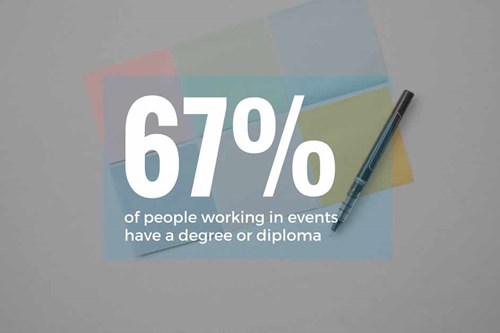Industry profile: Event planning and management

Last week we ran an interview with event and marketing coordinator Emma Stevens. This week we’re following it up with an industry profile for anyone considering following in her footsteps and becoming a thrower of corporate shivoos.
Read up and see if events management, with its focus on networking, organising, and attention to detail, is something that aligns with your skills and expectations – or if you’d prefer to let someone else post the invites.
What does the job (really) involve?
It’s not just about tasting cheeses and comparing venues with photos from Pinterest.com. Working in event management can involve a surprisingly broad range of responsibilities. Expect duties such as conference marketing, responding to inquiries from customers and suppliers, liaising with clients, and monitoring work done by contractors.
While jobs at dedicated companies may see individuals focused on only a few of these areas, many event managers will be tasked with all of the above.

What type of people are event managers and planners?
Obviously they’re not shrinking violets. Event managers must be eloquent communicators. According to US occupation data, in this case a fine proxy for Australia, the top two required skills for event managers are active listening and speaking.
Managers who are quick to fire off suggestions before adequately addressing client concerns and requests, however, won’t last long. The prime objective is to satisfy a client or employer brief. That means understanding what the event is about so you can craft a framework to guide creative choices.
In addition to being phenomenal communicators, event professionals must also possess fastidious time management and coordination abilities. If you’re itching to use your phone like a gun in a high-noon dual to delegate, change plans and set deadlines, you’ve probably got what it takes.
What are the chances of getting a job? And where?
In November 2014 there was an estimated 26,300 people working in event management and this number is expected to grow to 32,600 by November 2019. The number of job openings, meanwhile, was expected to be average compared with other industries and sit somewhere between 10,000 and 25,000 between November 2014 and 2019.
These ‘average’ figures, however, mask the fact that the occupation is demonstrating above average growth. The last 10 years have seen a wave of people enter the industry and provide significant growth from an initially small base of professionals. With increasing demand for events this growth is forecast to continue.
Yet, as with all occupations, a critical variable is where you live. Currently New South Wales and Victoria employ the lion’s share of event managers while Queensland seems underrepresented with only 14.8% of all event professionals residing there (low when you consider that 20.1% of all jobs are located in the Sunshine State). Both Western Australia and Tasmania also have a disproportionately lower number of event workers.
An important point, unfortunately, is that unemployment is comparatively quite high amongst event professionals. This is likely due to the cyclical nature of the role, which is hugely influenced by the business cycle and the popularity and appeal of the occupation.

What qualifications and training might I require?
Overwhelmingly the majority of people working in events – a huge 67.7% – possess either a degree or diploma. By comparison across all other occupations, only 30.7% of people have a degree or diploma. To us this suggests event management may be a favourite destination for the many degree and diploma holders who have studied non-mathematical commerce subjects such as marketing or management.
That’s not to say you’ve no chance of getting a job in events if you’ve only completed high school. But with only 10.6% of event workers noting Year 12 as their highest level of educational attainment, additional qualifications are probably a good idea.
How much can I earn and what are the hours like?
Across both full-time and part-time roles, the median earnings figure is $1,150 per week (not including superannuation and before tax). Interestingly this is a little higher than the median income from all occupations that sits at $950 per week.
But nothing is for free. Full-time employees can expect to work around 41.8 hours per week, which is a little higher than the 40.9 hours across all other occupations. The average week for a part-time employee, on the other hand, sits at around 17 hours.
Another drawback, on that note, is that only 71.6% of event workers have a full-time position.

What should I do next if I think events management and planning is for me?
Get out and do it. You don’t have to organise a huge corporate conference for over a thousand attendees to get a feel for what event management involves. Organise parties, kitchen teas, holidays up the coast and significant family birthdays. Last week Emma provided great advicefor those of you at school – get on the formal committee and organise the big night. It’s about getting acclimatised to the highs and lows of the role, and confirming it’s something you’d like to do as a profession.
A possible next step is to acquire formal qualifications. Upskilled offers a Diploma of Event Management (SIT50316) or Bachelor of Business (Tourism Management) (081295J). These courses can round out your understanding of the process and assist you on your way to becoming a professional event maestro.


)
)

